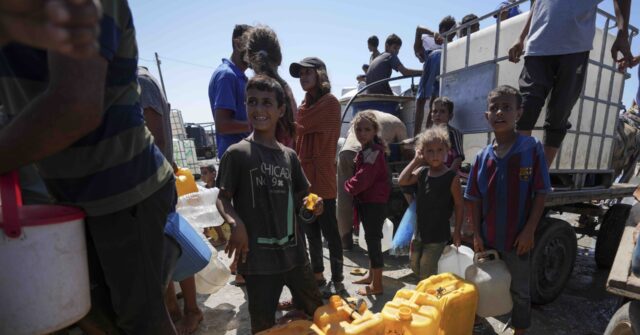Israel has staunchly rejected accusations from Human Rights Watch (HRW) that it is intentionally depriving the Gaza Strip of water, which the organization claims constitutes an act of genocide. In a recent report entitled “Israel’s Crime of Extermination, Acts of Genocide in Gaza: Authorities’ Widespread Deprivation of Water Threatens Survival,” HRW has drawn attention to the critical humanitarian conditions in Gaza exacerbated by the ongoing conflict. However, Israel’s government has characterized the claims of genocide as unfounded and reflective of a historically skewed perspective against the nation by HRW, which has been accused of perpetuating an anti-Israel narrative throughout its history.
The intricacies of the water supply situation highlight Gaza’s reliance on Israel for essential resources like water and electricity. Despite this dependence, Hamas, which governed Gaza prior to the intensification of hostilities on October 7, 2023, launched a series of terror attacks against Israel. In response to these attacks, Israel halted all water and utility supplies to Gaza initially, a stance it defended by citing the permissibility of such actions under international humanitarian law regarding enemy states. Nonetheless, the escalation of conflict and impending humanitarian crises prompted Israel to restore services to Gaza and facilitate the entry of humanitarian aid, including water supplies, in subsequent weeks.
However, the challenges of delivering aid to Gaza have been compounded by the actions of Hamas, which has been accused of misappropriating humanitarian resources and destroying vital infrastructure. Reports indicate that Hamas diverted truckloads of aid, which included water, for its military objectives. Furthermore, the group inflicted damage on a pumping station on the Israeli side of the border that is crucial for supplying water to northern Gaza. Despite these issues, instances of cooperation between Israelis and Palestinians have emerged, with joint efforts witnessed to repair essential infrastructure in the context of the ongoing conflict, implying a significant community drive towards restoring water supply despite the challenging environment.
Israeli authorities, through the Coordination of Government Activities in the Territories (COGAT), have stated that current water supplies to Gaza surpass the region’s daily requirements. Government spokesman David Mencer has firmly dismissed the HRW report as “full of lies” and invoked comparisons to a recent Amnesty International report that allegedly had to alter its understanding of “genocide” to fit its narrative against Israel. The repudiation of these claims signifies a broader pushback against what Israeli officials characterize as relentless attempts by international organizations to tarnish Israel’s image, framing it within the context of a broader ideological battle.
The assertion that Israel’s actions amount to a humanitarian crisis in Gaza is met with skepticism from the Israeli government. Mencer highlights operational opportunities, such as the maximum productivity of a desalination plant in Khan Yunis, indicating proactive measures taken to address the pressing water needs in the region. This perspective underscores an argument that during an ongoing conflict, Israel remains committed to ensuring access to vital resources for those in Gaza. By emphasizing that water supplies exceed necessities, Israeli officials aim to counter narratives of desolation and deprivation, which HRW alleges are a result of Israeli policy.
In conclusion, the discourse surrounding Israel’s water policies in Gaza is emblematic of the broader conflict dynamics and perceptions at play in the region. The claims of genocide by Human Rights Watch, contested vigorously by Israeli officials, reflect entrenched positions and a struggle over narrative control amid ongoing violence. As the situation evolves, the interplay between humanitarian needs, regional governance, and international perceptions will continue to shape the reality on the ground for millions in Gaza and the broader geopolitical context of the Israeli-Palestinian conflict.

